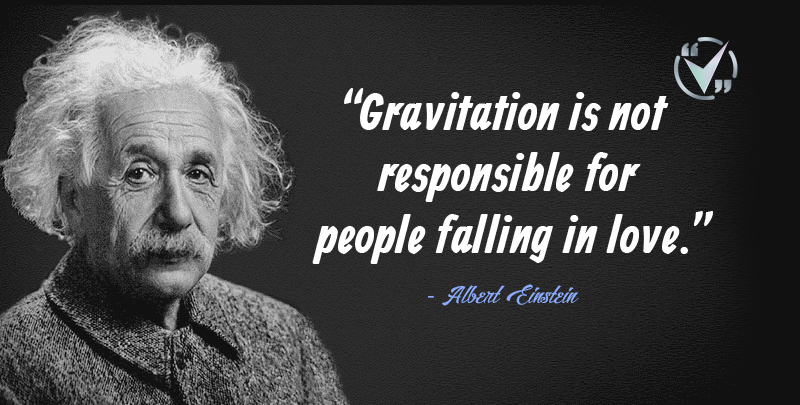Albert Einstein: A Genius in the Depths of Minds
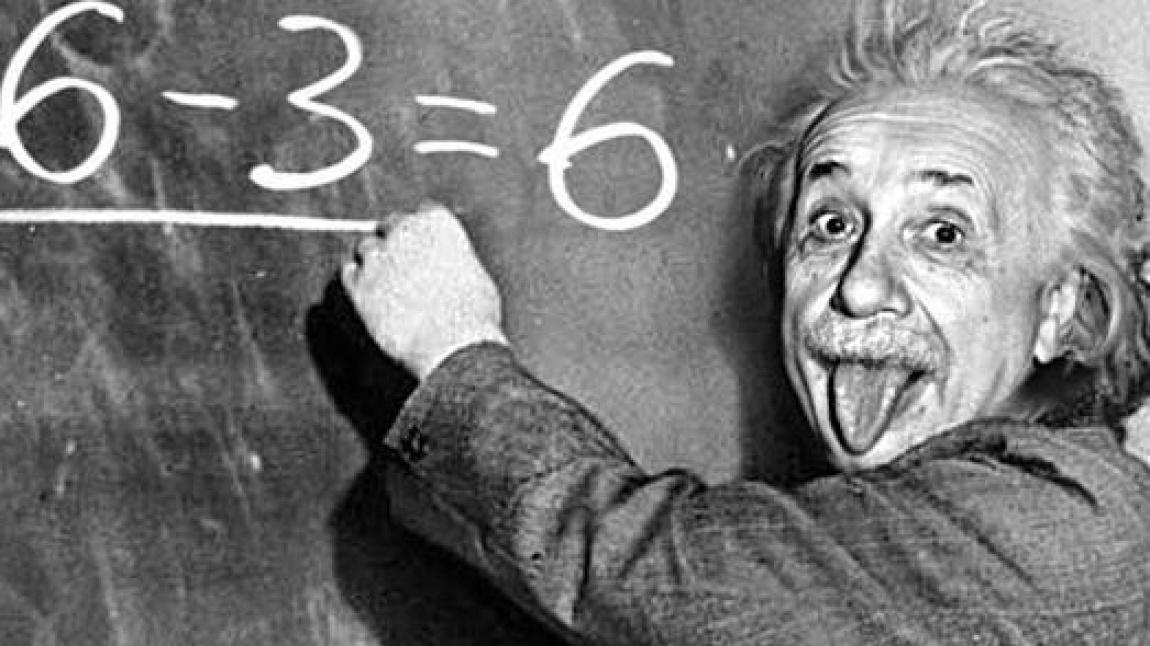
Albert Einstein, considered one of the most influential scientists of the 20th century, is a genius who made significant contributions not only to the world of science but also to humanity as a whole. Born on March 14, 1879, in the city of Ulm, Germany, Einstein left an everlasting mark with his revolutionary work in theoretical physics.
Einstein's most famous equation, E=mc^2, expresses the relationship between energy and matter. This equation forms the foundation of his special theory of relativity and is a cornerstone of modern physics. However, Einstein's brilliance extended beyond theoretical physics. His studies on the photoelectric effect earned him the Nobel Prize in Physics.
Einstein's intelligence was not confined to the realm of scientific knowledge. His thought experiments and philosophical views deeply influenced our understanding of the nature of time and space. His ability to establish connections between science and art, mathematics and music, made him not just a scientist but also a versatile thinker.
Einstein's life is noteworthy not only for his contributions to the scientific world but also for his passion for human rights, peace, and justice. Fleeing Germany when Nazism rose, he immigrated to the United States and played an active role on the side of the Allied forces during World War II.
Even after Einstein's death, his legacy endures. His revolutionary contributions to science, depth of thought, and ethical values make Einstein a genius who left an unforgettable mark in history. His story is not just a narrative of the evolution of science but also an inspiration for exploring the potential of humanity.
Einstein's 1949 Prediction: Anticipating the Societal Shifts and Their Causes
We inhabit a planet where a select few control nearly everything. In their relentless pursuit of wealth, they've wreaked havoc on the environment, heedlessly depleting the Earth's resources for generations to come. The legacy they've left us is a future teetering on the edge, marked by the looming threats of famine, drought, and ceaseless heat, hinting at the ominous specter of extinction.
Questioning the Sanity: Unraveling the Actions of Certain Individuals
Are these individuals completely out of touch? The average IQ of someone with a net worth exceeding ten billion dollars is 151, indicating high intelligence. While this doesn't necessarily categorize them as psychopaths, they prefer the term 'socio-diverse' if directly questioned.
Their unique trait enables them to skillfully manipulate the media, turning it into a tool for their propaganda, aided by their ownership of major media outlets. However, certain statements they make suggest a distinct 'socio-diverse' mindset. Take, for example, the response of Steven Schwarzman, the billionaire CEO of Blackstone Group, when Bernie Sanders advocated addressing inequality and questioned the existence of billionaires. During a book promotion event, Schwarzman retorted, 'Maybe Bernie Sanders shouldn’t exist.' This statement, a significant tell, hints at sociopathic tendencies, adding to the narcissism evident in his book's content. Other billionaires echoed similar sentiments, displaying outrage at Bernie's proposal.
It seems billionaires might not be the only ones resistant to finding solutions for inequality, not to mention neglecting the safety and well-being of the human race.
Einstein's Influence: Unveiling the Connections That Transcend Time
In the 1940s, Albert Einstein Engages in Existential Discourse: Unveiling Sociopathic Indifference to Humanity's Fate"
"In a thought-provoking exchange during the 1940s, Einstein and a 'Well-Disposed' Gentleman Confront the Specter of Sociopathic Disregard for the Human Race"
"Decades Ago, Einstein Faces Existential Queries: Examining Sociopathic Attitudes towards Humanity's Future
But Einstein, who had seen the terrifying reality of nuclear war — had unwittingly laid the scientific groundwork for it — goes on to discuss an equally great threat to mankind in this article published in the inaugural issue of “Monthly Review” in 1949. “The economic anarchy of capitalist society as it exists today is, in my opinion, the real source of the evil.”
He goes on to say:
“Private capital tends to become concentrated in few hands, partly because of competition among the capitalists, and partly because technological development and the increasing division of labor encourage the formation of larger units of production at the expense of smaller ones. The result of these developments is an oligarchy of private capital the enormous power of which cannot be effectively checked even by a democratically organized political society. This is true since the members of legislative bodies are selected by political parties, largely financed or otherwise influenced by private capitalists who, for all practical purposes, separate the electorate from the legislature. The consequence is that the representatives of the people do not in fact sufficiently protect the interests of the underprivileged sections of the population. Moreover, under existing conditions, private capitalists inevitably control, directly or indirectly, the main sources of information (press, radio, education). It is thus extremely difficult, and indeed in most cases quite impossible, for the individual citizen to come to objective conclusions and to make intelligent use of his political rights.”
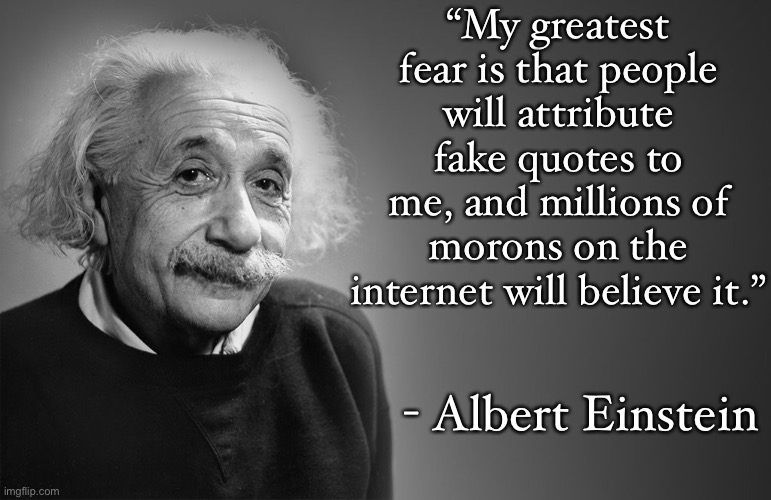
What Einstein Said
Einstein, in 1949, identified a "crisis" for humanity, delving into wealth concentration, an issue he saw in capitalism. He foresaw the alarming rise in inequality, notably in the U.S., evidenced by the Gini coefficient. Einstein anticipated the consequences of immense wealth, foreseeing corporate and individual power dominating democratic societies. Today, with CEO compensation 400 times the average worker's, his concerns echo loudly. Einstein lamented the control corporations exert over politics, a reality seen in the U.S. government's ownership by the top 1% and corporations.
Einstein highlighted how representatives, swayed by corporate interests, neglect the populace's issues. He pointed out the media's ownership by the wealthy, a situation exacerbated today with diverse platforms. Einstein's concern about capitalist influence on education resonates, evident in curriculum control and underpaid teachers. The media landscape, now including TV, internet, and influencers, shapes political and financial decisions, impairing objectivity as Einstein predicted.
We Didn't Listen
Einstein's warnings may have been dismissed, possibly due to ideological biases, with Monthly Review being a socialist magazine amid pervasive conservative propaganda. Similarly, the caution from WWII Supreme Allied Commander and 34th President Dwight D. Eisenhower in his 1961 farewell address about the growing influence of the military-industrial complex often went unheeded. Despite these prescient insights, political and ideological forces seemed to obstruct a broader acknowledgment of the potential consequences outlined by these influential figures.
“In the councils of government, we must guard against the acquisition of unwarranted influence, whether sought or unsought, by the military-industrial complex. The potential for the disastrous rise of misplaced power exists and will persist. We must never let the weight of this combination endanger our liberties or democratic processes. We should take nothing for granted. Only an alert and knowledgeable citizenry [bold by author] can compel the proper meshing of the huge industrial and military machinery of defense with our peaceful methods and goals, so that security and liberty may prosper together.”
Two decades post-Einstein's warning, the resonance with this cautionary note is unsettlingly familiar. The fact that we continue to disregard the wise counsel of our most brilliant minds raises questions about the effectiveness of wealth-driven propaganda and the collective awareness of the populace. The unfortunate reality may be that, given the unbridled spread of capitalism, our fate was sealed. Whether we lacked the opportunity or ability to resist is now irrelevant; the damage is irreversible. The consequences are severe, and we are compelled to confront them, even in the face of daunting challenges. It seems we are destined to face both hell and high water, and we must brace ourselves accordingly.
A Man Ambitious Enough to Attempt Unifying All of Physics into a Single Theory
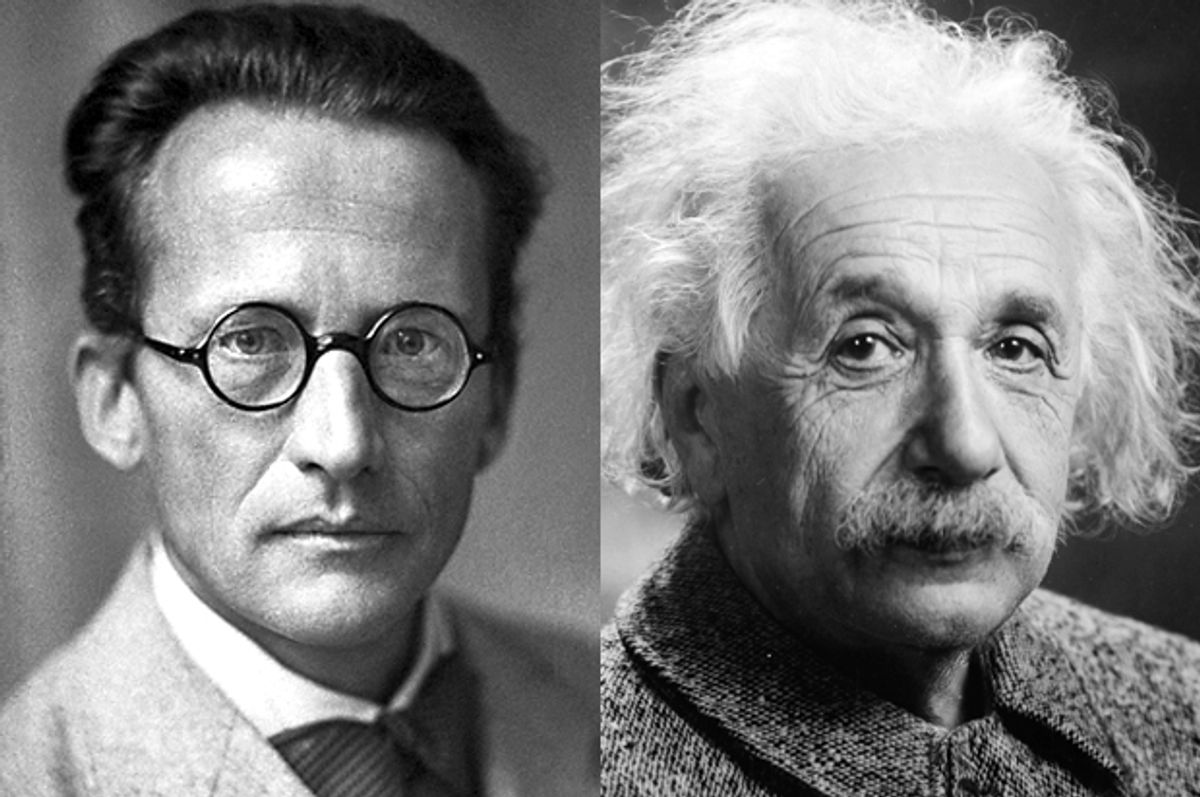
Albert Einstein, a towering figure in the realm of physics, was a man whose ambition soared to unparalleled heights. Born in 1879 in Germany, Einstein's intellectual journey reshaped the very foundations of our understanding of the universe. His audacious quest was nothing short of unifying the entirety of physics under a single, comprehensive theory.
Einstein's transformative journey began in 1905 with the introduction of the Special Theory of Relativity, a groundbreaking concept that intertwined the fabric of time and space. A decade later, he unveiled the General Theory of Relativity, which presented gravity as the result of the curvature of spacetime. These revolutionary ideas marked the inception of Einstein's grander vision — a unified field theory that could seamlessly bring together all the diverse forces governing the cosmos.
Yet, the path to unification proved to be an arduous one. Despite his genius, Einstein faced formidable challenges in reconciling the principles of quantum mechanics with his deterministic worldview. The scientific community eagerly awaited a singular theory that could bridge the apparent gaps between the behavior of celestial bodies and the behavior of subatomic particles.
Although Einstein's pursuit of a unified theory remained elusive during his lifetime, his legacy endures as a testament to human curiosity and intellectual bravery. His audacity to envision a singular framework for the entirety of physics inspired generations of scientists to follow in his footsteps. While the unified theory he sought remains a goal for future physicists, Einstein's contributions have forever altered the trajectory of scientific inquiry, leaving an indelible mark on our understanding of the cosmos.
Albert Einstein Quotes
- “Two things are infinite: the universe and human stupidity; and I'm not sure about the universe.”
- “There are only two ways to live your life. One is as though nothing is a miracle. The other is as though everything is a miracle.”

- important than knowledge. Knowledge is limited. Imagination encircles the world.”
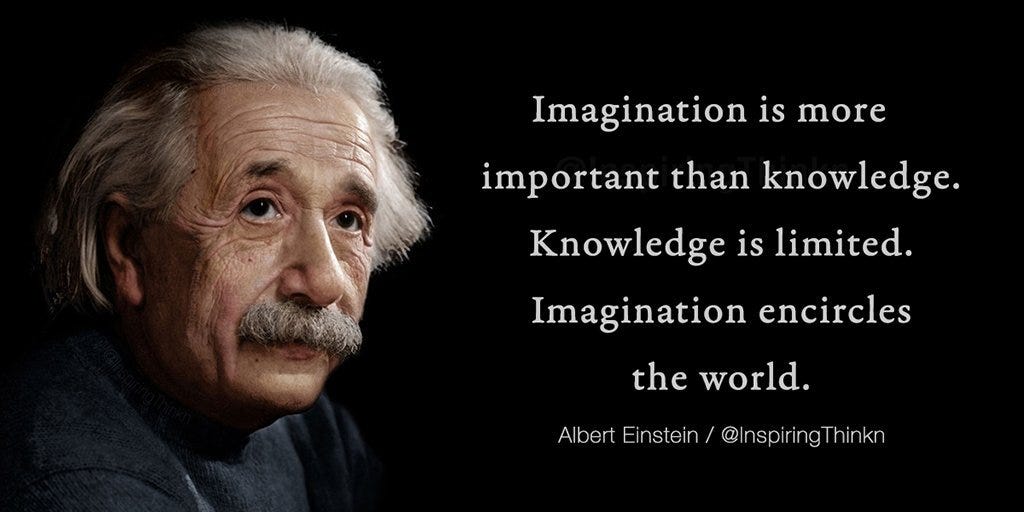
- “If you want your children to be intelligent, read them fairy tales. If you want them to be more intelligent, read them more fairy tales.”
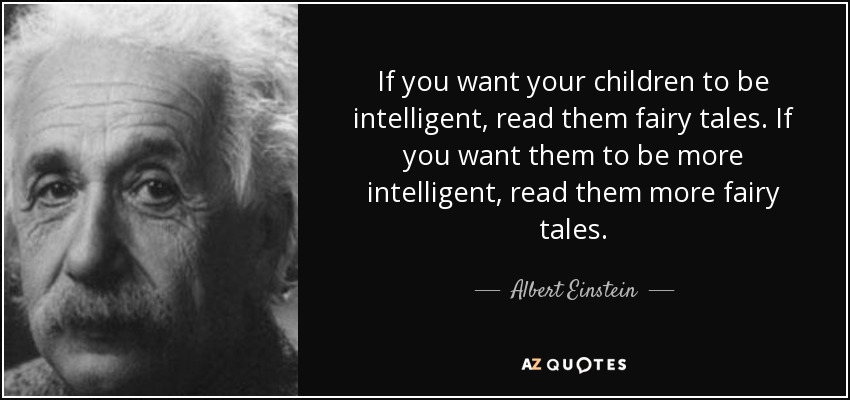
- “I speak to everyone in the same way, whether he is the garbage man or the president of the university.”
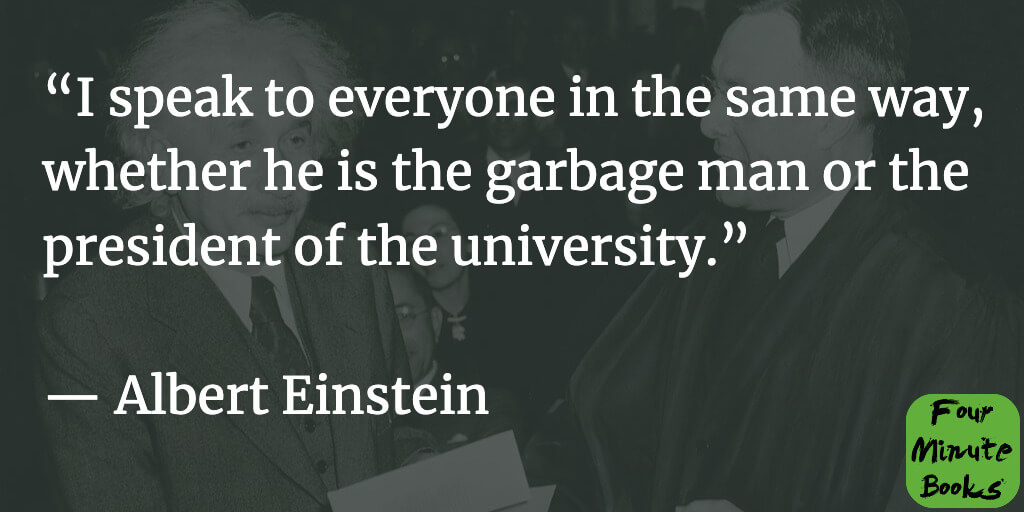
- “If we knew what it was we were doing, it would not be called research, would it?”
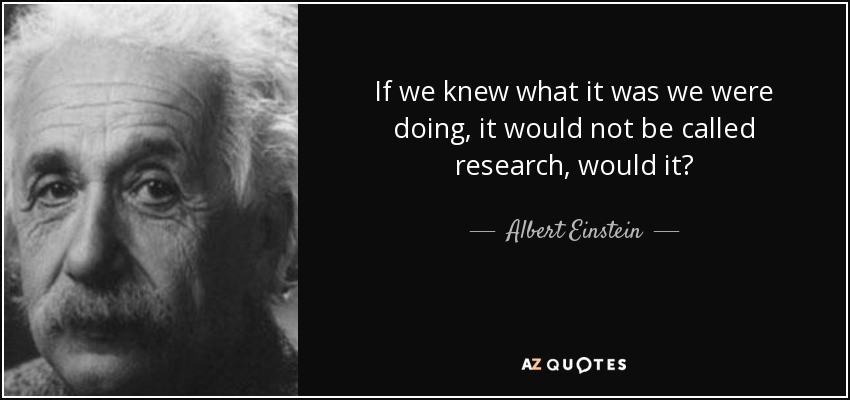
- “I have no special talents. I am only passionately curious.”

- “A human being is a part of the whole called by us universe, a part limited in time and space. He experiences himself, his thoughts and feeling as something separated from the rest, a kind of optical delusion of his consciousness. This delusion is a kind of prison for us, restricting us to our personal desires and to affection for a few persons nearest to us. Our task must be to free ourselves from this prison by widening our circle of compassion to embrace all living creatures and the whole of nature in its beauty.”
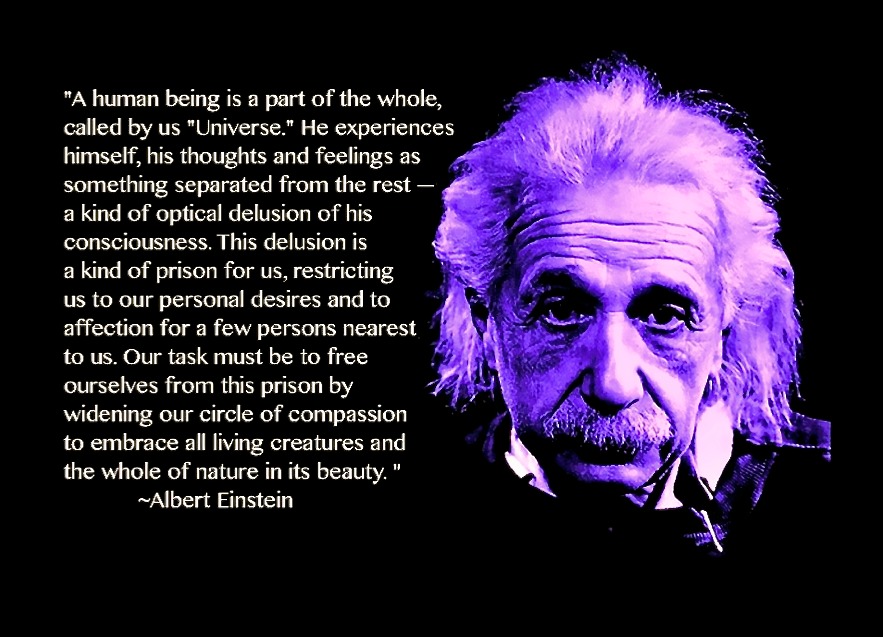
- “The important thing is not to stop questioning. Curiosity has its own reason for existence. One cannot help but be in awe when he contemplates the mysteries of eternity, of life, of the marvelous structure of reality. It is enough if one tries merely to comprehend a little of this mystery each day.
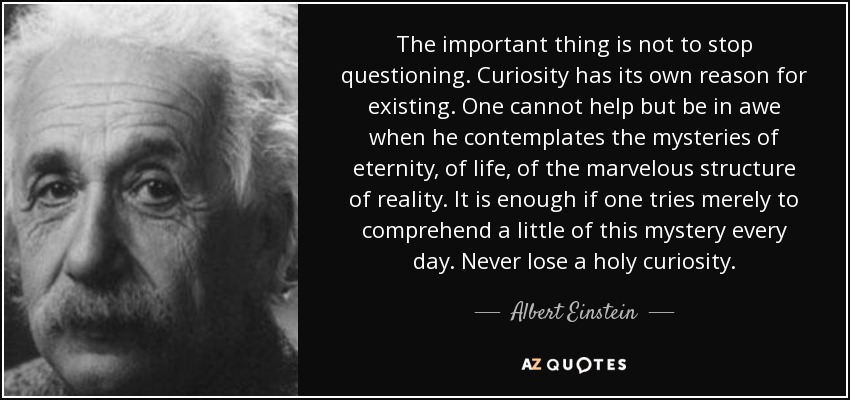
- “The world as we have created it is a process of our thinking. It cannot be changed without changing our thinking.”
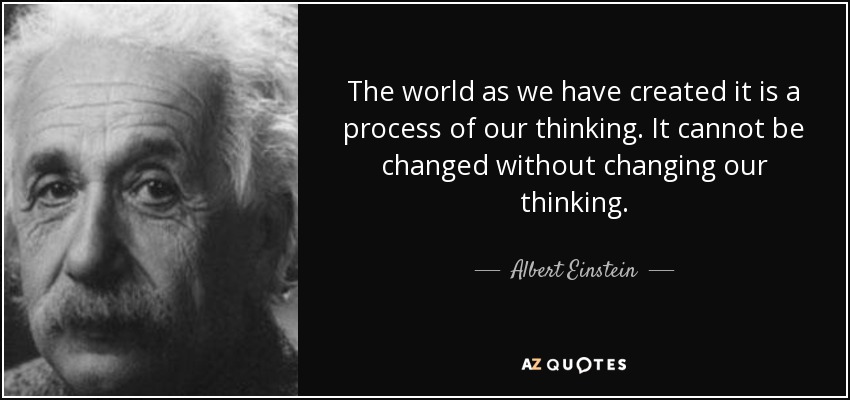
- “The most beautiful experience we can have is the mysterious. It is the fundamental emotion that stands at the cradle of true art and true science.”

- “Once you can accept the universe as matter expanding into nothing that is something, wearing stripes with plaid comes easy.”
- “Great spirits have always encountered violent opposition from mediocre minds.”

- “Gravitation is not responsible for people falling in love.”
